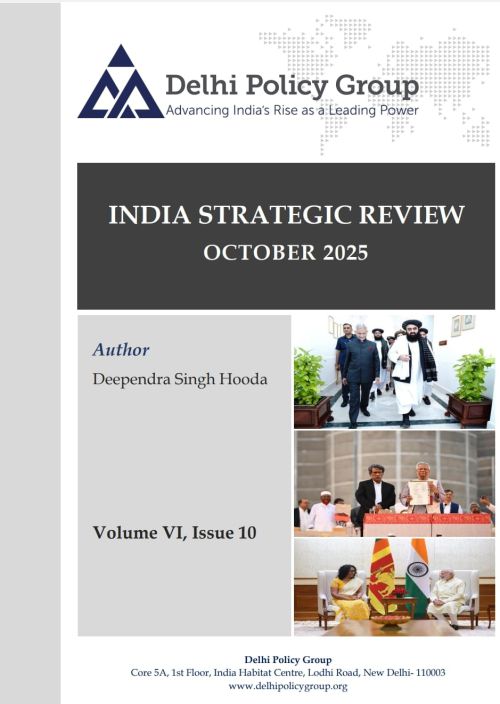India Strategic Review
The ISR features an assessment of key developments, trends, and policies pertaining to India’s immediate and continental neighbourhood and is authored by Lt. Gen. Deependra Singh Hooda (Retd.), Distinguished Fellow for Military Strategy.
Taliban Foreign Minister Mawlawi Amir Khan Muttaqi visited India from October 9-15. In his meeting with External Affairs Minister Dr. S. Jaishankar, Muttaqi affirmed that the Afghan government will not allow any group or individual to use the territory of Afghanistan against India. Dr Jaishankar committed to providing humanitarian and capacity building assistance to Afghanistan, and announced the upgrading of India's technical mission in Kabul to a full embassy status.
There was a sharp deterioration in Pakistan-Afghanistan ties after Pakistan carried out airstrikes in Kabul and Paktika on October 9. Heavy fighting erupted along the Durand Line, in which at least 23 Pakistani soldiers were killed. On October 19, both sides agreed to a ceasefire, but subsequent talks held between the two sides in Doha and Istanbul have ended in a stalemate. Pakistani Defence Minister Khawaja Asif has accused the Taliban of fighting "India's proxy war.”
There was a political realignment in Pakistan-Occupied Kashmir, with the defection of at least 10 Pakistan Tehreek-e-Insaf (PTI) lawmakers to the Pakistan Peoples Party (PPP). A no-confidence motion has been moved against Prime Minister Chaudhry Anwarul Haq, whose ouster appears imminent. There was also a change of leadership in Khyber Pakhtunkhwa, with Chief Minister Ali Amin Gandapur resigning on October 8 over growing terrorist violence in the province.
Pakistan’s internal security situation remains grim. Pakistan’s fatalities in terrorist violence in the first three quarters of 2025 have nearly reached the total fatalities of 2024, and if the trend continues, 2025 could mark one of the deadliest years in a decade. Violent clashes were witnessed in Punjab when supporters of Tehreek-e-Labbaik Pakistan (TLP) clashed with the police while attempting to march towards Islamabad to express solidarity with the Palestinians. On October 23, the Pakistani government declared the TLP a proscribed organisation under the Anti-Terrorism Act.
The 23rd round of the India-China Corps Commander-level talks was held in Eastern Ladakh on October 25. While both sides are prioritising stability at the Line of Actual Control, no new steps have been announced on the pullback of the estimated 50,000 troops deployed in Eastern Ladakh on each side.
In Bangladesh, with Sheikh Hasina’s Awami League remaining barred from elections, the Islamic parties sense an opportunity to gain political power. Seven religious parties have joined Bangladesh Jamaat-e-Islami and announced a new set of programmes to press home their demands.
Fifteen serving officers of the Bangladesh Army were arrested on charges of enforced disappearances, murders, and custodial deaths during the Sheikh Hasina regime. There have been some reports that the arrests have caused anger and division in the army, with senior officers opposing the arrests and civil trials.
Dr Harini Amarasuriya, the Prime Minister of Sri Lanka, undertook her first official visit to India from October 16-18. Her public schedule included a meeting with Dr. S. Jaishankar, a call on Prime Minister Narendra Modi, a visit to NITI Aayog, and a homecoming stop at Hindu College, where she studied sociology.
After the Gen Z revolution, which ousted the KP Sharma Oli-led government last month, normalcy is slowly returning to Nepal. However, Nepal’s major political parties are yet to reconcile with their loss of power and are challenging the legitimacy of the interim government led by Prime Minister Sushila Karki.
To read this India Strategic Review, Vol. VI, Issue 10, please see the PDF attached.



